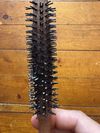community I bought a microscope, how does my scalp/hairs look? I've been suffering diffuse thinning and hair loss after covid and never recovered (2 yrs ago) I eat healthy, in shape and workout.
A person with hair loss since COVID-19 is considering treatments like finasteride and minoxidil but is hesitant due to potential side effects. Suggestions include visiting a dermatologist, using a ketoconazole shampoo, and considering that post-COVID hair loss might be an autoimmune response.
